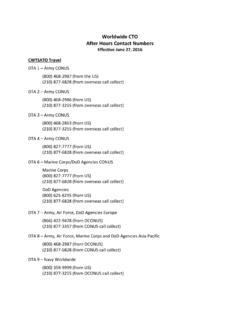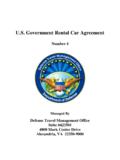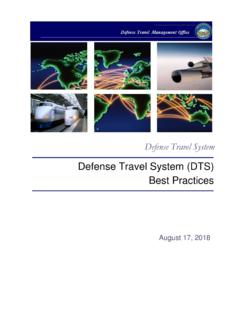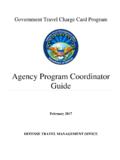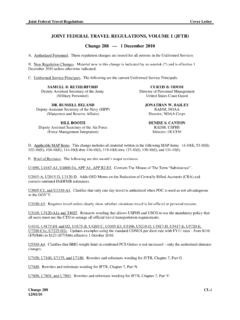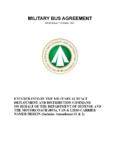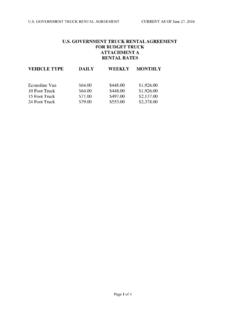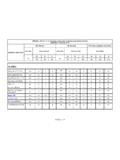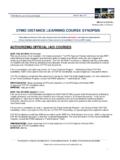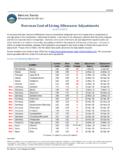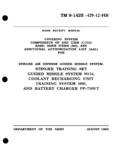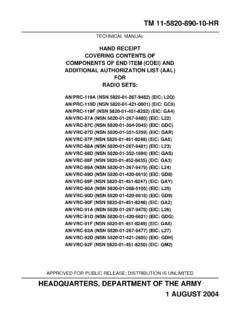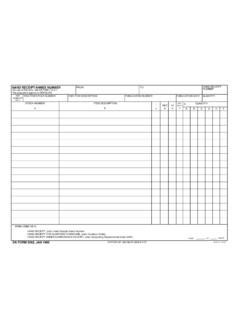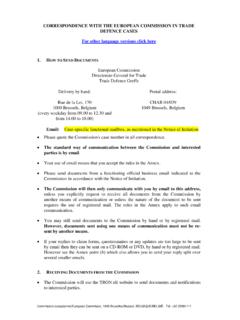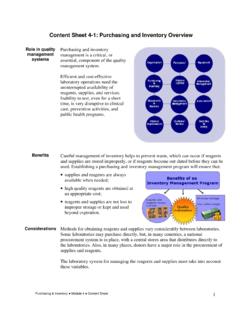Transcription of Cardholder Reference Edition - United States …
1 DEFENSE TRAVEL MANAGEMENT OFFICE April 2018 1 Government Travel Charge Card Regulations Cardholder Reference Edition This Cardholder Reference Edition is derived from the GTCC Regulations DEFENSE TRAVEL MANAGEMENT OFFICE April 2018 2 Government Travel Charge Card Regulations Cardholder Reference Edition Table of Contents POLICY AND 3 1. Overview .. 3 2. Benefits of Using the GTCC .. 3 3. 3 4. Misuse .. 3 GENERAL TRAVEL CARD INFORMATION .. 4 1. Agency Program Coordinators (APCs) .. 4 2. Cardholder Responsibilities .. 4 3. Two Types of Travel Cards .. 5 4. Online Account Access .. 5 5. Cash Withdrawals .. 6 6. Split Disbursement .. 6 7. Expenses Incident to Official Travel .. 6 SPECIAL TRAVEL 7 1.
2 Mission Critical (MC) Travel .. 7 2. Mission Critical Permanent Change of Station (PCS) Travel .. 7 3. Local Travel .. 7 4. Long Term Travel .. 7 ANNEX 1 TRAVEL CARD VENDOR FEES .. 8 ANNEX 2 DELINQUENCY TIMELINE .. 9 STATEMENT OF UNDERSTANDING (SOU) .. 10 DEFENSE TRAVEL MANAGEMENT OFFICE April 2018 3 Government Travel Charge Card Regulations Cardholder Reference Edition POLICY AND PURPOSE 1. Overview The Government Travel Charge Card (GTCC) is mandated to be used by DoD personnel to pay for authorized expenses when on official travel unless an exemption is granted. This includes temporary duty (TDY) and, per Component guidance, permanent change of station (PCS) travel. 2. Benefits of Using the GTCC Use of the GTCC provides several benefits to the Cardholder when compared to the use of personal credit cards or other forms of payment, to include: extended payment timelines (up to 60 days for TDY travel and up to 120 days for PCS travel), no interest charges, direct payment (via split-disbursement), no hit against a credit report when applying, and more accurate voucher submissions.
3 In addition, benefits to the Department include rebates returned from the travel card vendor ( allowing the Services to bring dollars back to their programs), reduced costs of issuing and reconciling travel advances, and greater access to travel data to help improve and implement new travel programs. It also improves financial and traveler readiness leading to mission completion. 3. Compliance Cardholders must use their Government travel card only for authorized travel expenses as described in the Joint Travel Regulations (JTR) and not for personal use. Military personnel who misuse the card are subject to disciplinary actions in accordance with Article 92 of the Uniform Code of Military Justice (UCMJ).
4 Civilian personnel who misuse the travel card may be subject to appropriate administrative or corrective action. 4. Misuse Misuse is defined as any unauthorized use of the GTCC. Examples include using the card: (a) for adult entertainment, (b) for gambling, (c) for expenses related to personal, family or household expenses when not in travel or PCS status, (d) to pay for the expenses of anyone other than the Cardholder or an authorized dependent, (e) for cash withdrawals more than three days prior to travel start date, and (f) intentionally failing to pay undisputed charges in a timely manner. DEFENSE TRAVEL MANAGEMENT OFFICE April 2018 4 GENERAL TRAVEL CARD INFORMATION 1. Agency Program Coordinators (APCs) APCs are the primary point of contact for cardholders within their organization.
5 They help cardholders with everything from the GTCC application process and setting up their accounts to the everyday use of the travel card. APCs are responsible for execution and management of the day-to-day operations of the DoD travel card program. 2. Cardholder Responsibilities A. Training. When an individual first receives a travel card and then every three years after that, they must complete the Program & Policies - Travel Card 101 training course that is available on the TraX web site. Cardholders will ensure a copy of their certificate of completion is retained by the APC or can be obtained from TraX. Refresher training may also be completed using other training sources as approved by the applicable Component Program Manager (CPM).
6 Refresher training and the updated SOU will be documented and retained either electronically or in hard copy by the APC. B. Before Travel. Cardholders must immediately verify card receipt with the travel card vendor. Cardholders must also update their traveler profile in DTS or other applicable travel system with their GTCC account number and expiration date. Cardholders are responsible for providing a signed Statement of Understanding (SOU) and certificate of training to their APC upon initial card issuance, arrival and in-processing into a new organization and every three years thereafter. An electronic version of the SOU with digital signatures is available at Additionally, cardholders should confirm with their APC that the card is active and there is sufficient available credit based on mission needs.
7 If the Cardholder s demographic information (mailing address, email address, phone number, etc.) changes at any time, they must also advise the travel card vendor and their APC of the change. Cardholders whose mail has been returned to the travel card vendor for non-delivery will have a return mail indicator placed on their account. A return mail indicator deactivates the travel card until the mailing address has been updated and/or verified with the GTCC vendor by the Cardholder or APC. C. During Travel. Ensure the card is used to pay for all official travel expenses, unless there has been an exemption granted. If the Cardholder finds their card has not been activated or the card declines for any other reason, they should contact their APC or the travel card vendor for resolution.
8 Cardholders may be exempt from certain state taxes for lodging in selected States . Travelers are directed to obtain tax information from the GSA SmartPay website and present the tax exempt form to the merchant for exemption to be applied. D. After Travel. Cardholders are required to submit travel vouchers within five business days of travel completion, and use split disbursement to pay their travel card bill. It is the travel Cardholder s responsibility to pay any remaining balance of undisputed charges no later than the due date, regardless of the status of their travel reimbursement. Accounts are considered past due at 31 days past billing and delinquent if unpaid 61 days after the billing date. Cardholders DEFENSE TRAVEL MANAGEMENT OFFICE April 2018 5 with a restricted card should advise their APC to place their travel card in a deactivated status upon return from travel.
9 E. Disputed Charges. If the billing statement includes questionable charges, the Cardholder will first contact the merchant to try to resolve the questionable charge. If unsuccessful, the Cardholder will obtain a dispute form from the APC, or from the travel card vendor s website. The Cardholder will complete and send the form to the travel card vendor. All disputes must be submitted within 60 days of the date on the billing statement on which the erroneous charge first appeared. It is the responsibility of the Cardholder to ensure the dispute form has been received by the travel card vendor. Once the dispute notification has been received by the travel card vendor, the travel card vendor will issue a provisional credit for the amount of the dispute pending resolution.
10 Formally disputed charges will not age and the account will not suspend for lack of payment. Disputes found in favor of the merchant will result in the disputed charge being placed back onto the cardholders account, with the Cardholder responsible for repayment as well as any applicable late fees. Disputes found in favor of the Cardholder will result in a permanent credit against the account, relieving the Cardholder from responsibility for disputed amount. 3. Two Types of Travel Cards A. Standard Cards. Standard cards are issued to individuals with a qualifying FICO credit score of 660+. The default limits are $7,500 for credit, $665 for cash, and $250 for retail purchases. Increased limits can be requested on a temporary basis (not to exceed 12 months) to meet mission needs when validated by commanders and supervisors.
